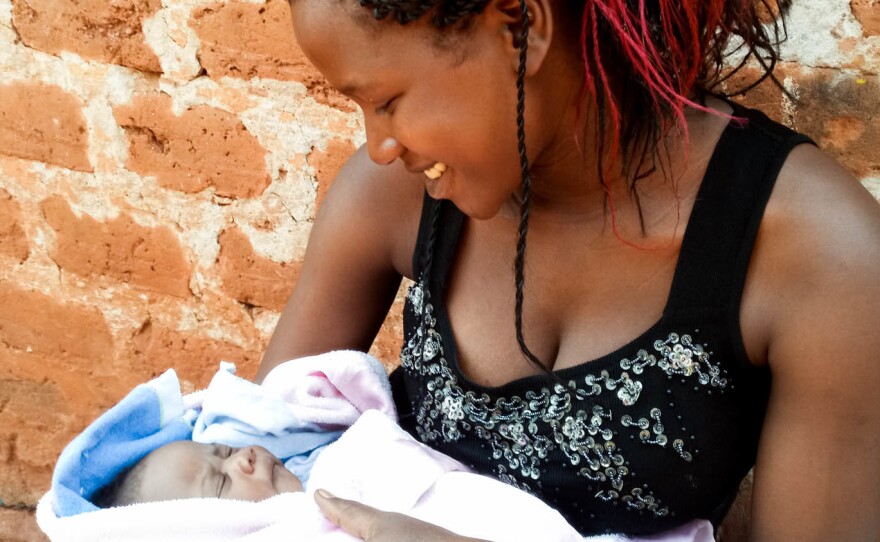Not that long ago, Maria Nalubega, 16, suspected she was pregnant.
The teen from Mbuya-Kinawataka, a slum in Uganda, had not been using contraception with her boyfriend of two years. She feared what her neighbors might think if they saw her buying condoms at the local shop. She was terrified to ask for advice from her single mother, who expected to her to abstain from sex until marriage.
And she simply thought she was too young to become pregnant.
In Uganda — where I also grew up — Nalubega's circumstances are not unusual. It's hard for young people to get information about sex and pregnancy. So they're vulnerable to sexually transmitted infections and unintended pregnancies. In fact, one in four girls between the ages of 15 to 19 in Uganda has given birth or is carrying her first child, according to the country's 2016 Demographic and Health Survey.
As a Global Health Corps fellow with a passion for adolescent health, I believe we can do better. I'm 28 and single, so I know that easy access to contraception and accurate information about birth control give women power over their bodies and lives.
Like Nalubega's mother, my mother was a single parent. And she too never talked to me about sex. When I was about 9, I used to eavesdrop on my older siblings — who were about 10 years older than me — when they talked about sex. What was sex, exactly? Why was it something they spoke about in hushed tones? If I broached the subject, they said I was too young and would receive counselling on sex when I became "ripe" for marriage.
I was curious, so I joined a life skills class at school with the hopes that my questions would be answered. Peer educators from a local organization came in and put on shows with music, dance and drama to illustrate the dangers of sexually transmitted diseases like HIV/AIDS. They also talked relationship issues — like, how do you say no when a boy asks you for sex?
But the educators emphasized abstinence. They believed that you can't trust anyone but yourself. Just because someone looks good or seems clean doesn't mean they don't have an STD. If you abstain, then you can save yourself a lot of trouble, they said.
I learned more about sex in my teens by reading books from the school library. I also got information from friends who were a lot more experienced. Some told me that it's not worth it if you're not ready.
Over a decade later, the subject of sex is still taboo in many homes across Uganda. Young people today have better ways to get the information themselves, from TV or the internet (although the internet is full of misinformation as well). But information alone doesn't curb high-risk behavior, like not using condoms, that can result in teen pregnancies.
So how do we begin to teach young women what they need to know? Today, family planning stakeholders will meet in London for the Family Planning Summit to renew their commitment to family planning, especially for adolescents and teen mothers. They'll shine a spotlight on efforts that work, some of which I've seen first hand.
Currently, I work for an international organization on a project that helps pregnant teens and adolescent mothers in Uganda. We train health providers to offer teen mothers a range of contraceptive choices. And we encourage young mothers to tell their friends about family planning.
Health care workers need to have an open mind when they talk to pregnant teens. Instead of asking young women why they were having sex in the first place, they should ask: How can I support you to have a healthy pregnancy? How can we help prevent another pregnancy until your baby is at least two years old? On an emotional level, this can make it easier for women to talk to health care workers if they feel they're not being judged.
We also need to keep girls in school. Although Uganda's Ministry of Education encourages pregnant students to continue school as long as they can, stigma exists. Fellow students and school administrators often pressure pregnant girls to quit. They want to protect the image of the school.
Nalubega had her baby three weeks ago. It's a girl. Currently, she is taking a break from secondary school to care for her baby and breastfeed. Not being in school is "the most difficult part," she says. "It hurts when my friends tell me all the exciting stuff that is going on. I feel like I have lost so much time."
But that's changing soon. Nalubega's mom has offered to care for the baby so she can go back to school. She's hoping to return in February.
All her future plans depend on it, she says.
And she has a definite goal in mind: Nalubega wants to become the kind of health worker that she wishes she had been able to speak with nine months ago.
Ritah Namwiza joined the Global Health Corps in July 2016 and has been working with the Uganda office of Jhpiego, an international health organization and affiliate of Johns Hopkins University.
Copyright 2017 NPR. To see more, visit http://www.npr.org/.






